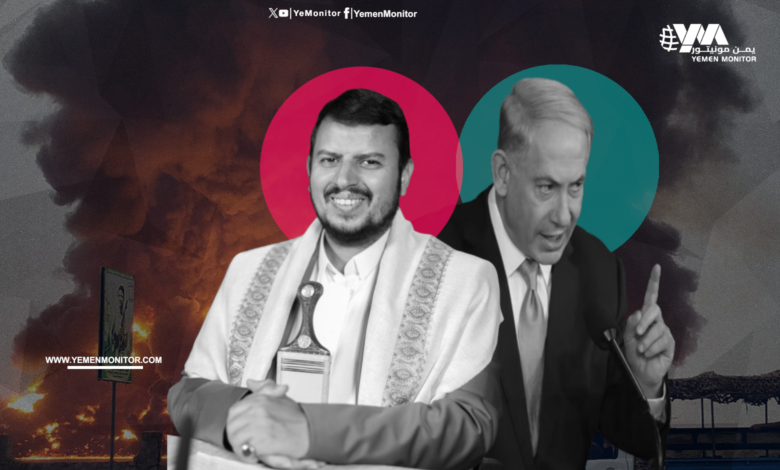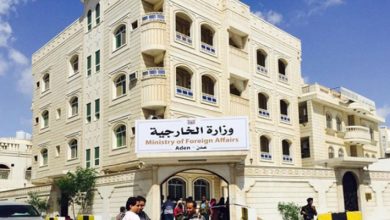
Yemen Monitor/Reporting Unit/Exclusive:
At least 9 Yemenis were killed and dozens more were injured in an Israeli occupation attack on the city of Hodeidah, west of the country, on Saturday. This is the first recognized Israeli attack on Yemeni soil since October 7.
Abdulmalik al-Houthi, leader of the Houthis, said in a televised statement on Sunday: “We are extremely happy with the direct battle with the Israeli enemy.”
This raises questions about the motivations behind the Houthis’ enthusiasm for a direct confrontation with Israeli occupation, and how it affects their image both domestically and internationally. Several analysts have shed light on these questions.
Nadwa Al-dawsary, a researcher at the Middle East Institute in Washington, said, “The Israeli air strike is exactly what the Houthis have been seeking for a long time to legitimize their power consolidation.”
Gregory Younsen, co-director of the Future Conflicts Institute at the US Air Force College, said that “what the Houthis want most” is to “show that they are fighting against the US-Saudi alliance”.
Younsen, an expert on Yemen affairs, added that “this helps them locally by matching their goals with the Palestinian issue, which enjoys great support in Yemen.”
Gathering the Crowd and Increasing Suppression
From one side, Yemeni researcher in the Middle East Stud y Center, Ibrahim Jalal believes that the Houthis will use Israeli attacks to rally the crowd around them, leading to an open escalation both domestically and internationally.
According to a report by Yada’out Ahranot Journal, quoting Israeli officials, “Tel Aviv expects a response from the Houthis over the Hodeidah attacks, and we will strike them hard.”
Yemenis are united in supporting the Palestinians in Gaza Strip and rejecting Israeli attacks in Hodeidah. The internationally recognized Yemeni government and political parties supporting it have issued two statements condemning the Israeli occupation and describing the attacks as “aggression” and “violation of Yemen’s sovereignty”.
Al-Dawsary believes that the Israeli attacks provide “a pretext for increasing population Suppression and violence in Yemen and beyond”.
Jalal agrees, saying that the Israeli attacks give the Houthis a free hand to continue suppressing without opposition, using accusations of being “pro-Zionist” and “pro-American” as a pretext.
In his Sunday statement, the Houthi leader said: “One of the most important benefits of these events and their outcomes is the revelations that people have about their true nature. Today, with the Israeli enemy’s direct aggression against our country, it is an opportunity for others to know their true nature. Who is the hypocrite in all its meanings?”
Recently, dozens of UN employees and former Western embassy staff were accused of working for US and Israeli intelligence agencies.
Jalal notes that the Houthis want to remain in a state of “open war” to avoid fulfilling their governance duties (salaries, services, and rights).
Al-Dawsary agrees with Jalal, adding that “the Houthis excel at inciting conflict to maintain their power”.
Jalal points out that the Houthis aim to isolate “society and confine it to a binary ‘with us or against us’ mentality with continued indoctrination”.
Recruitment
Majed al-Madhaji, director of the Sana’a Center for Strategic Studies, told France Press that the airstrike lends legitimacy to the Houthis’ claims that they are waging a war with Israel, which will make the group more attractive to those who are angry and outraged in Yemen over the war in Gaza.
From another angle, Afrah Nasir, an analyst at the Arab Center in Washington DC, considers these attacks a crucial propaganda tool for the rebels. “For the rebels, these attacks can be a powerful recruiting tool,” she said. “It can attract new recruits and strengthen their base.”
Iranian Weapons
The port of Hodeidah, a vital entry point for fuel and international aid to Houthi-controlled areas, has largely remained off-limits in the war.
Israeli Prime Minister Benjamin Netanyahu said the attacks on Hodeidah port are because the Houthis are using the port to receive Iranian weapons.
Political analyst Andreas Craig, a lecturer in security studies at King’s College London, said the Israeli strike “will not significantly weaken the Houthis’ supply chains” for weapons.
He told AFP that “missile components can be delivered in different ways and do not require large port facilities,” explaining that “Iran has greatly diversified its supply chains and will find other ways” to deliver weapon components that can be assembled locally.




